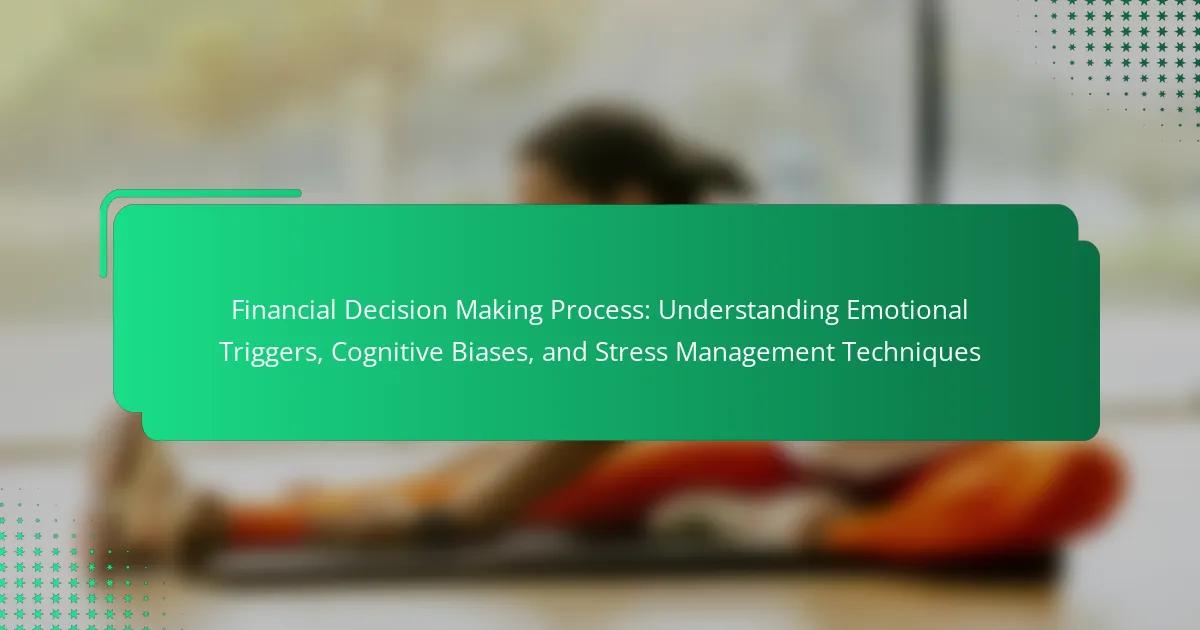Effective financial decision making is crucial for achieving long-term goals and stability. Emotional triggers, such as fear of loss and overconfidence, can distort judgment. Cognitive biases, like loss aversion and confirmation bias, further complicate choices. Implementing stress management techniques, including mindfulness and deep breathing, can enhance clarity and lead to more rational financial decisions.

What are the emotional triggers that influence financial decision making?
Emotional triggers significantly influence financial decision making by affecting judgment and behavior. Key triggers include fear of loss, desire for gain, overconfidence, and social influences. Fear of loss can lead to risk-averse choices, while the desire for gain can encourage risky investments. Overconfidence may result in underestimating risks, and social influences can create herd behavior. Understanding these triggers helps individuals navigate their financial decisions more effectively.
How do emotions affect our spending habits?
Emotions significantly influence spending habits by triggering impulsive decisions and cognitive biases. Emotional states like happiness or sadness can lead to increased spending, often as a coping mechanism. Research indicates that consumers experiencing positive emotions are more likely to indulge in luxury purchases, while negative emotions can lead to either excessive spending or frugality, depending on the individual. Stress management techniques, such as mindfulness, can help mitigate emotional spending by promoting more rational financial decision-making.
What role does fear play in financial choices?
Fear significantly influences financial choices by triggering emotional responses that can lead to irrational decisions. Individuals often avoid risks due to fear of loss, resulting in overly conservative investment strategies. This fear can stem from past financial failures or societal pressures, creating cognitive biases that skew judgment. Effective stress management techniques, such as mindfulness and education, can mitigate fear’s impact, enabling more rational decision-making. Understanding these dynamics is crucial for improving financial literacy and fostering healthier financial behaviors.
How can understanding emotional triggers improve financial outcomes?
Understanding emotional triggers can significantly enhance financial outcomes by promoting better decision-making. Emotional awareness helps individuals recognize biases that may affect their financial choices. For instance, fear of loss can lead to hasty decisions, while overconfidence may result in risky investments. By managing these emotional triggers, individuals can adopt a more rational approach to financial planning. Techniques such as mindfulness and cognitive reframing can reduce stress and improve clarity, ultimately leading to more informed financial decisions.

What cognitive biases impact our financial decisions?
Cognitive biases significantly influence our financial decisions by distorting how we perceive value and risk. Common biases include loss aversion, where losses weigh heavier than equivalent gains, and confirmation bias, leading individuals to favor information that supports their existing beliefs. Anchoring bias can cause reliance on initial information, affecting investment choices. Understanding these biases can enhance financial decision-making and stress management.
Which common cognitive biases should we be aware of?
Cognitive biases can significantly impact financial decision-making. Key biases to be aware of include confirmation bias, loss aversion, overconfidence bias, anchoring, and herd behavior.
Confirmation bias leads individuals to favor information that supports their existing beliefs, hindering objective analysis. Loss aversion causes greater emotional pain from losses than pleasure from equivalent gains, often resulting in overly cautious decisions. Overconfidence bias can lead to unrealistic assessments of one’s knowledge or predictive abilities, influencing investment choices. Anchoring occurs when individuals rely too heavily on the first piece of information encountered, skewing subsequent judgments. Lastly, herd behavior drives people to follow the crowd, often disregarding personal analysis.
Understanding these biases can enhance financial decision-making processes and mitigate emotional triggers.
What is confirmation bias in financial decision making?
Confirmation bias in financial decision making is the tendency to favor information that confirms existing beliefs while disregarding contradictory data. This cognitive bias can lead to poor investment choices and risk mismanagement. Investors may ignore market signals or data that challenge their strategies, resulting in suboptimal outcomes. Recognizing this bias is crucial for making informed financial decisions and mitigating risks.
How does loss aversion affect investment choices?
Loss aversion significantly influences investment choices by causing individuals to prioritize avoiding losses over acquiring equivalent gains. This emotional bias leads investors to make conservative decisions, often resulting in missed opportunities for higher returns. Research indicates that the pain of losing is psychologically about twice as powerful as the pleasure of gaining, which can skew investment strategies toward safer assets. As a result, investors may hold onto losing investments too long or prematurely sell winning ones to avoid potential losses. Understanding this bias is crucial for effective financial decision-making.
How can we mitigate the effects of cognitive biases?
To mitigate the effects of cognitive biases in financial decision making, implement structured decision frameworks. These frameworks promote rational analysis over emotional reactions. Techniques such as setting predefined criteria for investments, utilizing checklists, and seeking diverse perspectives can reduce bias. Regularly reviewing decisions can also enhance awareness of cognitive traps.

What stress management techniques can enhance financial decision making?
Stress management techniques can significantly enhance financial decision-making by reducing emotional triggers and cognitive biases. Techniques such as mindfulness meditation, deep breathing exercises, and cognitive restructuring help individuals gain clarity and improve focus. These practices lower stress levels, leading to more rational financial choices. Additionally, regular physical activity can enhance mood and cognitive function, further supporting sound decision-making. By integrating these techniques, individuals can navigate financial decisions with greater confidence and reduced anxiety.
How does financial stress influence decision making?
Financial stress significantly impairs decision-making by inducing emotional triggers and cognitive biases. Stress leads to impulsive choices, often driven by anxiety and fear. For instance, individuals under financial strain may prioritize short-term gains over long-term stability, resulting in poor investments. A study found that stress can decrease cognitive function, hindering critical thinking. Effective stress management techniques, such as mindfulness and budgeting, can mitigate these effects, promoting more rational financial decisions.
What are effective stress relief strategies for financial decisions?
Effective stress relief strategies for financial decisions include mindfulness practices, structured decision-making frameworks, and seeking professional advice. Mindfulness techniques, such as meditation, help individuals manage emotional triggers and reduce anxiety. Implementing a structured framework, like cost-benefit analysis, allows for clearer evaluation of options. Additionally, consulting with financial advisors can provide objective perspectives, mitigating cognitive biases and enhancing decision quality.
How can mindfulness practices aid in financial decision making?
Mindfulness practices enhance financial decision making by promoting emotional awareness and reducing cognitive biases. Techniques such as meditation and focused breathing can help individuals manage stress, leading to clearer thinking and better judgment. This improved emotional regulation allows for more rational financial choices, minimizing impulsive spending and enhancing long-term planning. Research indicates that mindfulness can significantly lower anxiety levels, which is crucial during financial decision making.
What role does physical health play in managing financial stress?
Physical health significantly influences financial stress management by enhancing cognitive function and emotional resilience. Individuals in good health often experience lower levels of stress, allowing for clearer decision-making. Regular physical activity can reduce anxiety, which is a common emotional trigger in financial decision-making. Furthermore, maintaining a balanced diet supports overall well-being, contributing to better focus and reduced impulsivity in financial choices. As a result, prioritizing physical health can lead to improved financial outcomes and reduced stress levels.
What are the benefits of a structured decision-making process?
A structured decision-making process enhances financial decision-making by reducing emotional triggers and cognitive biases. It fosters clarity, improves consistency, and facilitates stress management. This approach leads to better outcomes by promoting rational analysis over impulsive reactions.

How can understanding the mental impact of money decisions lead to better outcomes?
Understanding the mental impact of money decisions can lead to better outcomes by enhancing emotional awareness and reducing cognitive biases. Recognizing emotional triggers allows individuals to make more rational choices, while awareness of biases like loss aversion can prevent poor financial decisions. Implementing stress management techniques further supports clear thinking during financial planning. This holistic approach ultimately fosters healthier financial behaviors and improved decision-making outcomes.
What best practices can individuals adopt for healthier financial decisions?
To make healthier financial decisions, individuals should recognize emotional triggers, address cognitive biases, and implement stress management techniques. Understanding how emotions influence spending can prevent impulsive purchases. Cognitive biases, such as overconfidence or loss aversion, can distort financial judgment, so practicing critical thinking is essential. Stress management techniques, like mindfulness or budgeting exercises, can enhance clarity and decision-making. By integrating these practices, individuals can improve their financial well-being.
What common mistakes should be avoided in financial decision making?
To avoid common mistakes in financial decision making, recognize emotional triggers, cognitive biases, and stress. Emotional reactions can lead to impulsive choices. Cognitive biases, such as overconfidence or loss aversion, distort rational thinking. Stress management techniques, like mindfulness, help maintain clarity. Prioritize informed analysis over emotional responses for better outcomes.
How can expert insights guide better financial choices?
Expert insights can significantly improve financial choices by addressing emotional triggers, cognitive biases, and stress management techniques. Understanding these factors helps individuals make rational decisions, leading to better financial outcomes. For instance, expert guidance can identify common cognitive biases like overconfidence or loss aversion, which often distort judgment. By recognizing these biases, individuals can approach financial decisions more objectively. Additionally, stress management techniques, such as mindfulness or structured decision-making processes, can reduce anxiety, enabling clearer thinking. Overall, leveraging expert insights fosters a more disciplined and informed financial decision-making process.


